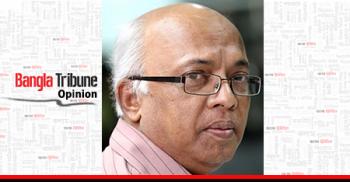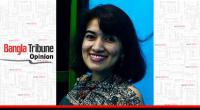 We should be going back to the Constitution as it was drafted, deliberated upon and adopted in 1972. It matters little what its detractors happen to be saying about it. There are some who think that Bangladesh will never go back to 1972. You tend to wonder why they should be saying that. Such men have always been vociferous defenders of the infamous Fifth Amendment, a piece of paper that will always be remembered for all the notoriety it brought into Bangladesh’s politics between August 1975 and April 1979 and even beyond that. When you place that amendment in juxtaposition to the 1972 Constitution, you know what your preference ought to be.
We should be going back to the Constitution as it was drafted, deliberated upon and adopted in 1972. It matters little what its detractors happen to be saying about it. There are some who think that Bangladesh will never go back to 1972. You tend to wonder why they should be saying that. Such men have always been vociferous defenders of the infamous Fifth Amendment, a piece of paper that will always be remembered for all the notoriety it brought into Bangladesh’s politics between August 1975 and April 1979 and even beyond that. When you place that amendment in juxtaposition to the 1972 Constitution, you know what your preference ought to be.
The 1972 Constitution is by far the best and most eloquent instance of our self-expression as a nation. And it is because you have within it all those principles that went into the forging of Bengali nationhood, into an espousal of the four ideals which governed our thoughts as we waged war against the state of Pakistan in 1971. For those of us who were witness, either on the fields of battle or in internal exile in occupied Bangladesh, to the villainy that could be committed by an army and by the very state it spoke for in the name of national integrity and in defence of what was clearly fake religiosity, thoughts of nationalism, democracy, secularism and socialism were patently the new and needed underpinning of our collective life as a nation. And yet, when you examine the historical parameters of Bengali heritage, you realise only too well that these four principles had always been at work among Bengalis. What occurred in 1947, when we decided to be part of Pakistan, was but an aberration. And no matter how some people might inform you that Partition was inevitable, that the two-nation theory was the dominant reality of the time, you know in your heart and in your soul that it was anything but the truth. And we paid grievously for it. As a matter of fact, the communalism that was inaugurated in the 1940s lingers, in diverse ways, all across the subcontinent.
The battle for Bangladesh in 1971 was, from the historical as well as philosophical perspective, a necessity in order for communalism, for an unnatural course of politics, to be set aside. That we were first of all secular Bengalis and not communal East Pakistanis were what increasingly came to be reasserted in the 1950s (think of the Jukto Front and, before that, the language movement) and reinforced through the 1960s. The War of Liberation simply formalized, through the supreme sacrifices of three million Bengalis, that secular Bengali spirit. The Constitution of 1972 was but a moral and legal adoption of that spirit. In the 1972 Constitution lay embedded the highest ideals of political liberalism. That the state of Bangladesh was the abode of everyone who inhabited it, everyone across the frontiers of faith, was the point the Constitution drove home. Religion, having regularly been an excuse for Pakistan’s rulers to explain away their political misconduct and their racial prejudices (what was done to East Pakistan was political and economic exploitation resting on deep-seated racism on the part of West Pakistan), was restored by the 1972 Constitution to its proper, noble place.
That is the good bit in the story. The bad came in with the Fourth Amendment to the 1972 Constitution. It was a bad move, an ominous one. And those who advised Bangabandhu to go for it did not quite realise the risks the country was being put to, even if a single-party state made sure that the four state principles remained intact. The Fourth Amendment, you can say in hindsight, was the perfect opportunity old Pakistan enthusiasts needed to destabilise Bangladesh. General Ziaur Rahman saw that opportunity through to reality. He had no business tampering with the Constitution. But since it has been the rule with dictators to play God, Zia thought he could do a bit of tinkering with 1972. And the moment he did that, through giving the Constitution a dash of the communal, he opened the floodgates to disaster. Had Bangladesh been a proper democracy constituted of a politically enlightened citizenry, the general and those who humiliated the country thus would have been held guilty of sedition.
If Zia hurled the first blow at the 1972 Constitution, General Hussein Muhammad Ershad followed with the next. He thought, in the infinity of his wisdom, that the state of Bangladesh was in dire need of a religion. People need religion. But Ershad told us Bangladesh needed a religion. And so the republic was burdened with one. Now the fallen dictator would like us to know that Bismillah and the state religion should not be tampered with. But that is not our concern, is it? Our worry has more to do with the fact that two military dictators have tampered with the 1972 Constitution. It is that constitution we must go back to if we mean to have secular democracy flourish in our land.
Democracy must touch the lives of all citizens. Which is why the 1972 Constitution, in its restored, retouched and rejuvenated form, must enshrine within it the political and historical rights of all the tribes, all the sub-cultures who have inhabited this territory for ages. They are the Chakmas, Marmas, Mros, Santals and so many others. Do not sacrifice them only because Bengalis happen to constitute the bulk of the population.
Syed Badrul Ahsan is the Editor-in-Charge at The Asian Age.


